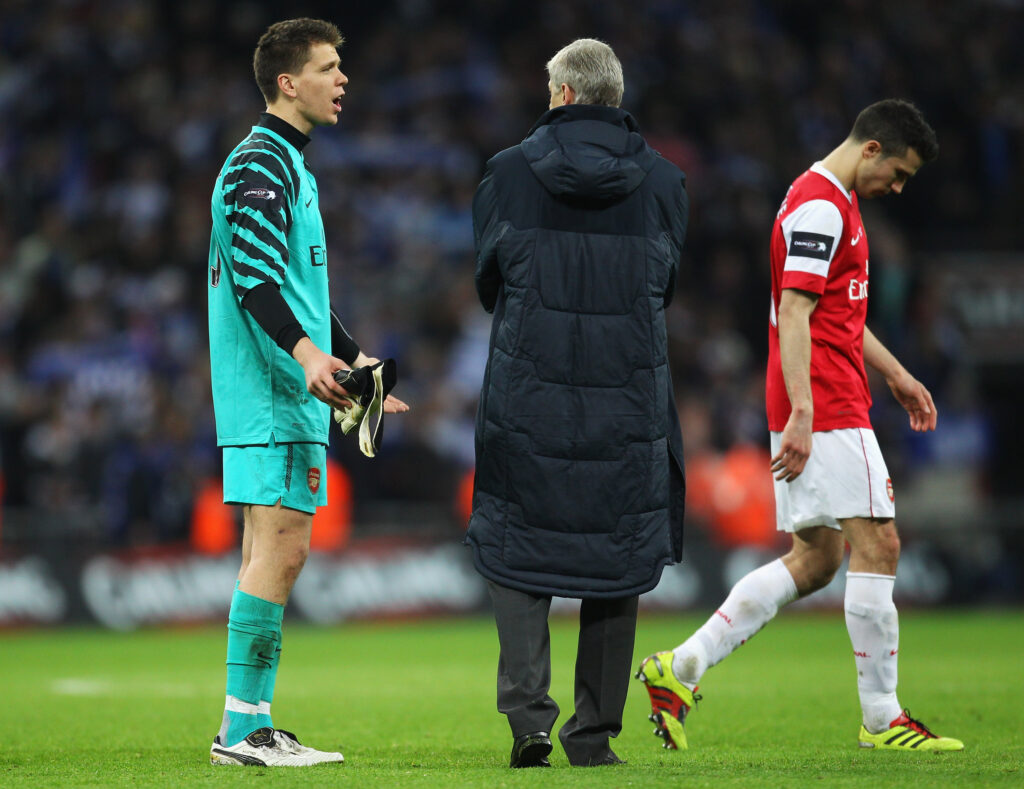Wojciech Szczęsny has finally received the explanation he spent years wondering about, after Arsène Wenger admitted the real reason behind the goalkeeper’s departure during a candid conversation filmed for Amazon Prime.

Arsène Wenger’s conversation with Wojciech Szczęsny has offered the clearest explanation yet of why the former Arsenal manager decided the goalkeeper’s future lay elsewhere, with the Frenchman admitting that the infamous Southampton smoking incident shaped his judgement more than any on-pitch weakness.
The exchange, filmed for Amazon Prime, begins with Wenger reflecting on Szczęsny’s body of work. “He had 84 caps, I think, something like that. So that’s a huge career. Personally, I regret that he stops. He can give to other people what he has learned and it’s a shame to lose people who can do that.”
Moments later, Szczęsny then enters the room, joking, “I’ve been listening. I’m not going to get emotional, by the way.”
The respect between them is clear. Szczęsny thanks Wenger directly: “You gave me the early platform. You were probably the most influential coach that I’ve had, one of the most influential people that I’ve met on my journey. The courage that you just gave me and the young boys at Arsenal because we had a good group.” It was, he says, the club’s “most difficult moment” for him personally.
But the heart of the conversation is Szczęsny’s long-held suspicion: that Wenger made his mind up after the New Year’s Day match at Southampton in 2015, the afternoon he was fined for smoking in the dressing room. “I wanted to know whether the decision was made in the afternoon based on the current situation, or whether it was made on New Year’s Day in Southampton two years earlier,” he asks.
“Because that’s what I felt. I felt that your mind was made in Southampton and there was no change in your mind, no matter what I did.”

Wenger does not dodge it. “Yes, Southampton played a big part in my mind,” he admits. Then, asked whether it was the football or what happened off the pitch, he replies: “The outside. Maybe I had the feeling that you were too comfortable and that reinforced my feeling.”
He expands on why that mattered. “It started for you, 20 years of age. When you know your young goalkeeper at 16 today, you go to a football club, it takes you, you have 10 keepers in front of you.” Szczęsny cuts in, acknowledging the point: “I did, to be fair.” Wenger continues: “You had that and you made it through, and then you think you’re on the motorway.”
Szczęsny agrees with the criticism. “I agree with the boss that I was probably too comfortable at the time. But I felt that the two years at Roma were enough. And I felt it was a mistake on your part as well.”
Wenger does not bristle. “Yeah, I made many mistakes and I regret every one,” he says, deadpan. Szczęsny laughs: “Yes, he admitted it! I can retire early.”
There is a poignancy to the latter part of the clip. Wenger asks Szczęsny about his future after retirement. “I’m not going to take on a new challenge for one year. I can’t do it. I have a daughter that’s two months old.” Wenger encourages him not to close the door. “You could play in another country from 35, 34,” he suggests. Szczęsny shakes his head: “I don’t have energy for that.”
Wenger gently pushes back. “It’s a good age now, 34 to 38, 39 is a fantastic age for a goalkeeper. And maybe we’ll make a comeback. It’s a wrong exit, you know? Maybe we’ll come back because he will really realise in a few months that not going in the dressing room in the morning is a lonely trip and so I hope that he will change his mind.”
The exchange is honest, affectionate, and unusually transparent. It confirms, finally, the fracture that ended Szczęsny’s Arsenal career while reminding everyone why Wenger inspired such loyalty from players who did not always agree with him.
